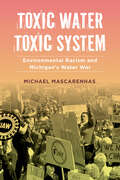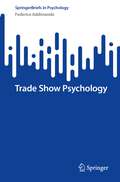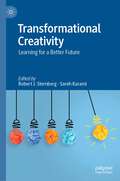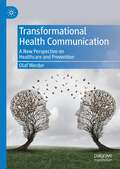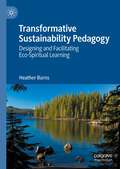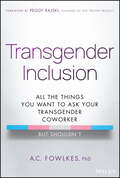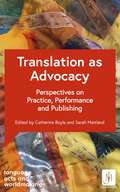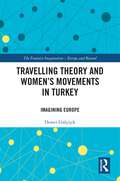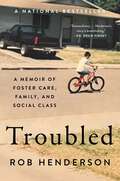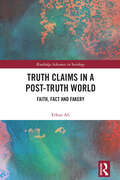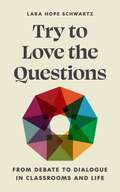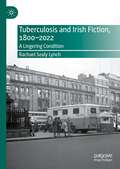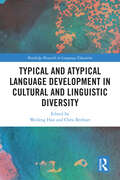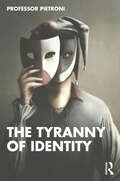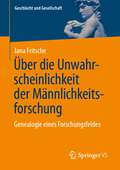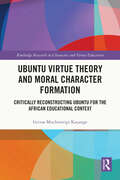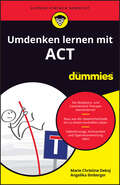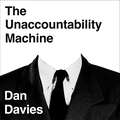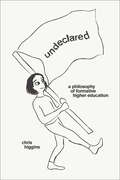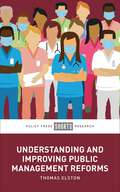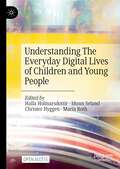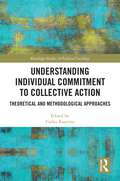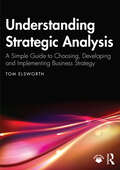- Table View
- List View
Toxic Water, Toxic System: Environmental Racism and Michigan's Water War
by Prof. Michael MascarenhasThe tireless resistance of local communities fighting for ownership of America’s third largest water system Toxic Water, Toxic System exposes the consequences of a seemingly anonymous authoritarian state willing to maintain white supremacy at any cost—including poisoning an entire city and shutting off water to thousands of people. Weaving together narratives of frontline activists along with archival data, Michael Mascarenhas provides a powerful exploration of the political alliances and bureaucratic mechanisms that uphold inequality. Drawing from three years of ethnographic fieldwork in Flint and Detroit, this book amplifies the voices of marginalized communities, particularly African American women, whose perspectives and labor have been consistently overlooked. Toxic Water, Toxic System offers a fresh perspective on the ties between urban austerity policies, environmental harm, and the advancement of white supremacist agendas in predominantly Black and brown cities.
Trade Show Psychology (SpringerBriefs in Psychology)
by Federico AddimandoIn this book, readers are taken on an illuminating journey into the world of trade shows from a unique perspective – the psychology of both exhibitors and attendees. This comprehensive guide delves deep into the intricacies of drawing visitors to your booth and forging meaningful connections. It offers a wealth of insights into the art of engaging potential clients effectively and understanding their behavior within the bustling trade show environment. The book covers a wide array of topics, including techniques for attracting visitors to your booth, effective communication strategies, and the psychology behind booth design. From the selection of color schemes and themes that resonate with your target audience to crafting compelling messages that leave a lasting impression, this book provides practical advice for achieving trade show success. It also explores the role of technology and digital marketing in modern trade show strategies, offering a blend of timeless principles and cutting-edge approaches. Moreover, the text delves into case studies and real-world examples from successful exhibitors, showcasing their innovative methods and success stories. Whether you're a seasoned trade show veteran or a newcomer looking to make a splash, this book equips you with the knowledge and strategies needed to thrive in the competitive world of trade shows. With its engaging and informative content, 'Trade Show Psychology' is an indispensable resource for anyone seeking to maximize their impact and ROI at trade shows.
Transformational Creativity: Learning for a Better Future
by Robert J. Sternberg Sareh KaramiThis edited volume brings together leading scholars in diverse disciplines to share their best thinking on how creativity can be conceived of, taught for, and deployed to serve rather than undermine humanity. Transformational creativity, as defined in this book, is creativity deployed to make a positive, meaningful, and potentially enduring difference to the world. Transformational creativity is compared to transactional creativity, which is creativity deployed in search of a reward, whether externally or internally generated.
Transformational Health Communication: A New Perspective on Healthcare and Prevention
by Olaf WerderThis book advances our understanding of communicative relationships and key barriers to more effective health communication. In this, it offers a humanistic orientation of health communication as well as its social, cultural, political, ethical, and spiritual dimensions and contexts. The book therefore brings a more inclusive and integrated approach to the major challenges and opportunities in contemporary health, medicine, and wellbeing.
Transformative Sustainability Pedagogy: Designing and Facilitating Eco-Spiritual Learning
by Heather BurnsThis book offers stories and tools for designing and facilitating transformative sustainability pedagogy and explores how educators can intentionally design and facilitate eco-spiritual learning that promotes healing and wholeness. In these times of accelerating climate change and systemic injustice, we need learning spaces that both challenge our unsustainable dominant paradigms and support us in re-learning how to live in relational and regenerative ways. Rooted in the paradigm of interconnection and relationality, this book offers practical ways to design and facilitate learning toward more just, ecological, and spiritual ways of being. The author weaves together a variety of personal stories of teaching and learning, an exploration of how new science can be applied to transformative sustainability pedagogy, and eco-spiritual practices to help educators nurture wholeness and connection in themselves and in learning spaces.
Transgender Inclusion: All the Things You Want to Ask Your Transgender Coworker but Shouldn't
by A. C. FowlkesDiscover the realities for transgender people in the workplace and beyond as they move through any of the three recognized kinds of transition—and how to be an ally. In Transgender Inclusion: All The Things You Want To Ask Your Transgender Coworker But Shouldn’t, clinical psychologist and trans inclusion specialist Dr. A.C. Fowlkes delivers an essential and remarkably honest discussion of the realities of the workplace for transgender people. In the book, you’ll explore the experiences that trans people have in the workplace as they move through none, one, or more of the three recognized kinds of transition—medical, social, and legal. You’ll learn answers to your questions about your transgender colleagues, so you can be respectful of your coworker’s feelings and work together comfortably. You’ll also find: Discussions of how and why transgender people often feel excluded from the workplace and by their colleagues Explorations of the unfortunately common reality of harassment and maltreatment of transgender workers How and why information about transgender experiences in the workplace is helpful to everyone Approximately 1.3 million adults in the United States identify as transgender. If you don’t already have a transgender friend, neighbor, or co-worker, you might very well have one in the future. A practical, compassionate, and evidence-based discussion of the transgender experience, Transgender Inclusion is a must-read guide for managers, executives, professionals, and allies who want to learn more and do more about trans issues in the workplace.
Translation as Advocacy: Perspectives on Practice, Performance and Publishing (Language Acts and Worldmaking)
by VariousWhat does it mean to advocate - in translation, for translation, through translation? What does advocacy look like, for those who do the translating or for those whose work is translated? To what extent is translation itself a form of advocacy? These 'what' questions are the driving force behind this collection.Translation as Advocacy highlights the innovative ways in which translator-academics in seven different fields discuss their practice in relation to their understanding of advocacy. The book aims to encourage people to think about translators as active agents bringing new work into the receiving culture, advocating for the writers they translate, for ideas, for practices. As such, the book asserts that the act of translation is a mode of cultural production and a political intervention through which the translator, as advocate, claims a significant position in intercultural dialogue.Featuring seven interrelated chapters, the book covers themes of judgement, spaces for translation, classroom practice, collaboration, intercultural position, textuality, and voice. Each chapter explores the specific demands of different types of translation work, the specific role of each stage of the process and what advocacy means at each of these stages, for example: choosing what is translated; mediating between author and receiving culture; pitching to publishers; social interactions; framing the translation for different audiences; teaching; creating new canons; gatekeepers and prizes; dissemination; marketing and reception. This book repositions the role of the translator-academic as an activist who uses their knowledge and understanding to bring agency to the complex processes of understanding across time and space. Moving critically through the different stages that the translator-academic occupies, using the spaces for research, performance and classroom teaching as springboards for active engagement with the key preoccupations of our times, this book will highlight translation as advocacy for students, educators, audiences for translation and the translation industry.Like all the volumes in the Language Acts and Worldmaking series, the overall aim is two-fold: to challenge widely-held views about language learning as a neutral instrument of globalisation and to innovate and transform language research, teaching and learning, together with Modern Languages as an academic discipline, by foregrounding its unique form of cognition and critical engagement.Specific aims are to:· propose new ways of bridging the gaps between those who teach and research languages and those who learn and use them in everyday contexts from the professional to the personal· put research into the hands of wider audiences· share a philosophy, policy and practice of language teaching and learning which turns research into action· provide the research, experience and data to enable informed debates on current issues and attitudes in language learning, teaching and research· share knowledge across and within all levels and experiences of language learning and teaching· showcase exciting new work that derives from different types of community activity and is of practical relevance to its audiences· disseminate new research in languages that engages with diverse communities of language practitioners.
Translation as Advocacy: Perspectives on Practice, Performance and Publishing (Language Acts and Worldmaking)
by VariousWhat does it mean to advocate - in translation, for translation, through translation? What does advocacy look like, for those who do the translating or for those whose work is translated? To what extent is translation itself a form of advocacy? These 'what' questions are the driving force behind this collection.Translation as Advocacy highlights the innovative ways in which translator-academics in seven different fields discuss their practice in relation to their understanding of advocacy. The book aims to encourage people to think about translators as active agents bringing new work into the receiving culture, advocating for the writers they translate, for ideas, for practices. As such, the book asserts that the act of translation is a mode of cultural production and a political intervention through which the translator, as advocate, claims a significant position in intercultural dialogue.Featuring seven interrelated chapters, the book covers themes of judgement, spaces for translation, classroom practice, collaboration, intercultural position, textuality, and voice. Each chapter explores the specific demands of different types of translation work, the specific role of each stage of the process and what advocacy means at each of these stages, for example: choosing what is translated; mediating between author and receiving culture; pitching to publishers; social interactions; framing the translation for different audiences; teaching; creating new canons; gatekeepers and prizes; dissemination; marketing and reception. This book repositions the role of the translator-academic as an activist who uses their knowledge and understanding to bring agency to the complex processes of understanding across time and space. Moving critically through the different stages that the translator-academic occupies, using the spaces for research, performance and classroom teaching as springboards for active engagement with the key preoccupations of our times, this book will highlight translation as advocacy for students, educators, audiences for translation and the translation industry.Like all the volumes in the Language Acts and Worldmaking series, the overall aim is two-fold: to challenge widely-held views about language learning as a neutral instrument of globalisation and to innovate and transform language research, teaching and learning, together with Modern Languages as an academic discipline, by foregrounding its unique form of cognition and critical engagement.Specific aims are to:· propose new ways of bridging the gaps between those who teach and research languages and those who learn and use them in everyday contexts from the professional to the personal· put research into the hands of wider audiences· share a philosophy, policy and practice of language teaching and learning which turns research into action· provide the research, experience and data to enable informed debates on current issues and attitudes in language learning, teaching and research· share knowledge across and within all levels and experiences of language learning and teaching· showcase exciting new work that derives from different types of community activity and is of practical relevance to its audiences· disseminate new research in languages that engages with diverse communities of language practitioners.
Travelling Theory and Women’s Movements in Turkey: Imagining Europe (The Feminist Imagination - Europe and Beyond)
by Demet GulcicekDrawing on archival research, Travelling Theory and Women’s Movements in Turkey examines the imagination of Europe in the context of women’s rights movements in a self-defined non-European setting. It brings travelling theory, poststructuralist feminist theories and orientalist studies together to provide an original theoretical framework for understanding the complex and often contradictory imaginations of Europe. Such imaginations can be an object of desire, fantasy, hate and hostility in a non-European context. This volume sheds light on the manner in which local power dynamics are reproduced, negotiated and subverted during the travel of women’s and feminist movements. With a focus on the late Ottoman Empire, the book questions how ‘Other’ positions can be inhabited by the ‘Self’ and unpacks sexual and normative dimensions of demanding women’s rights in this context. As such, it will appeal to scholars of sociology, cultural studies and gender studies with interests in feminist theory and notions of European and non-European categories.
Troubled: A Memoir of Foster Care, Family, and Social Class
by Rob HendersonA NATIONAL BESTSELLER In this raw coming-of-age memoir, in the vein of The Short and Tragic Life of Robert Peace, The Other Wes Moore, and Someone Has Led This Child to Believe, Rob Henderson vividly recounts growing up in foster care, enlisting in the US Air Force, attending elite universities, and pioneering the concept of &“luxury beliefs&”—ideas and opinions that confer status on the upper class while inflicting costs on the less fortunate.Rob Henderson was born to a drug-addicted mother and a father he never met, ultimately shuttling between ten different foster homes in California. When he was adopted into a loving family, he hoped that life would finally be stable and safe. Divorce, tragedy, poverty, and violence marked his adolescent and teen years, propelling Henderson to join the military upon completing high school. An unflinching portrait of shattered families, desperation, and determination, Troubled recounts Henderson&’s expectation-defying young life and juxtaposes his story with those of his friends who wound up incarcerated or killed. He retreads the steps and missteps he took to escape the drama and disorder of his youth. As he navigates the peaks and valleys of social class, Henderson finds that he remains on the outside looking in. His greatest achievements—a military career, an undergraduate education from Yale, a PhD from Cambridge—feel like hollow measures of success. He argues that stability at home is more important than external accomplishments, and he illustrates the ways the most privileged among us benefit from a set of social standards that actively harm the most vulnerable.
Truth Claims in a Post-Truth World: Faith, Fact and Fakery (Routledge Advances in Sociology)
by Erkan AliDrawing on debates from a multi-disciplinary perspective, this book examines what it means to offer a genuine sociological critique of religious faith, illiberalism and anti-secularism from a macro perspective. Arguing that as a discipline concerned with real issues in the social world, sociology should be at the forefront of any analysis of religious power and legitimacy, the author contends that much religious faith is fundamentally incompatible with any twenty-first-century society that seeks inclusive, utilitarian and humanistic principles as its goals. With an emphasis on sociology, the effects of organised religion’s overall decline in modern Western contexts are explored, while the troubling re-emergence or persistence of faith-based and other non-evidentiary perspectives is also discussed via debates around identity politics, postmodernism and multiculturalism. Through an analysis of the rise of irrational thinking in our politics and our entire social and cultural fabric, the book moves to conclude that religious beliefs and other forms of dogmatism are underpinned by powerful, influential and potentially dangerous ideological structures at various levels of society and that viable, secular alternatives to faith teachings ought to be nurtured in their place. A critique of religion that advances modern, secular humanistic thought, Truth Claims in a Post-Truth World will appeal to scholars of sociology, social theory and philosophy with interests in religion, political thought, ethics and civil society.
Try to Love the Questions: From Debate to Dialogue in Classrooms and Life (Skills for Scholars)
by Lara SchwartzAn essential guide to dialogue in the college classroom and beyondTry to Love the Questions gives college students a framework for understanding and practicing dialogue across difference in and out of the classroom. This invaluable guide explores the challenges facing students as they prepare to listen, speak, and learn in a college community and encourages students and faculty alike to consider inclusive, respectful communication as a skill—not as a limitation on freedom.Among the most common challenges on college campuses today is figuring out how to navigate our politically charged culture and engage productively with opposing viewpoints. Lara Schwartz introduces the fundamental principles of free expression, academic freedom, and academic dialogue, showing how open expression is the engine of social progress, scholarship, and inclusion. She sheds light on the rules and norms that govern campus discourse—such as the First Amendment, campus expression policies, and academic standards—and encourages students to adopt a mindset of inquiry that embraces uncertainty and a love of questions.Empowering students, scholars, and instructors to listen generously, explore questions with integrity, and communicate to be understood, Try to Love the Questions includes writing exercises and discussion questions in every chapter, making it an indispensable resource for anyone interested in practicing good-faith dialogue.
Tuberculosis and Irish Fiction, 1800–2022: A Lingering Condition (New Directions in Irish and Irish American Literature)
by Rachael Sealy LynchThis book focuses on Ireland’s lived experience of tuberculosis as represented in the nation’s fiction; not surprisingly, the disease both manifests and conceals itself with devastating frequency in literature as it did in life. It seeks to place the history of tuberculosis in Ireland, from 1800 until after its virtual eradication in the mid-Twentieth Century, in conversation with fictional representations or repressions of a condition so fearsome that until very recently it was usually referred to by code words and euphemisms rather than by its name.
Typical and Atypical Language Development in Cultural and Linguistic Diversity (Routledge Research in Language Education)
by Weifeng Han and Chris BrebnerTypical and Atypical Language Development in Cultural and Linguistic Diversity brings together state-of-the-art studies in both typical and atypical language development. Placing the topic in the context of cultural and linguistic diversity (CALD), the book offers readers serious theoretical consideration of the topic and provides implications for multilingual educational and clinical practices. The content covers a wide range of topics related to multilingual language development in CALD: typical and atypical language development in CALD, and the interface between both; the relationship between multilingual competence and academic performance in CALD; providing unbiased speech and language measures in CALD; and heritage and minority languages education in CALD. Each chapter outlines the core theoretical and practical issues and explores both theoretical and pedagogical/clinical implications in the area and possible future developments. This volume is an essential resource for all those who study, research, or are interested in multilingual development, educational linguistics, and clinical linguistics in the CALD context.
The Tyranny of Identity
by Patrick PietroniThe Tyranny of Identity is both a personal and highly interdisciplinary examination of the wide range of factors and disciplines at play in the formation of identity. It takes a novel and unique approach to this through use of metaphor, images, poetry and a wide range of academic sources to provide a holistic approach to the study of identity. This book uses the concept of Babushka dolls to show that we all have a series of activities during our lives that reside in our mind, body, spirit – each influencing the multiple identities we knowingly or unknowingly possess. This collage of factors and forces allows us to create an identity. The layers of identity unfold as the chapters progress and in doing so the book addresses the manifold ways in which identity intersects with nationhood, politics, education, the culture wars, family, religion, gender and contemporary institutions. The Tyranny of Identity is a wide-ranging, cross-cultural book that integrates and explores how the issue of identity has become a central issue in every academic discipline. This book is essential reading to all students studying identity and all readers seeking a deeper understanding of this complex topic.
Über die Unwahrscheinlichkeit der Männlichkeitsforschung: Genealogie eines Forschungsfeldes (Geschlecht und Gesellschaft #80)
by Jana Fritsche‚Männlichkeit‘ gilt als lange gleichgesetzt mit dem ‚Allgemein-Menschlichen‘ und daher als Spezifikum regelrecht unsichtbar. Was macht das Nachdenken über und die Beforschung von ‚Männlichkeit‘ dann epistemologisch wie gesellschaftlich wahrscheinlich? Dieser Frage geht die vorliegende Studie aus gesellschaftstheoretischer Perspektive nach. Entlang sozialwissenschaftlicher Publikationen zu ‚Männlichkeit‘ von 1908-2022 werden gesellschaftliche Zusammenhänge rekonstruiert, die die (wissenschaftliche) Reflexivierung von ‚Männlichkeit‘ bedingen. Damit stellt die Studie eine erste systematische Untersuchung des Feldes der Männlichkeitsforschung dar. Zudem entpuppt sich das vergleichsweise kleine Forschungsfeld als reichhaltiges Labor, an dem sich über dessen Partikularität hinaus soziologische Grundfragen und methodologische Aspekte diskutieren lassen: darunter Subjekt-Gesellschaft-Verhältnisse, Epistemologie und Operationalisierung, Prozesse der Grenzziehungen und Stabilisierung wissenschaftlicher Disziplinen sowie die Bedeutung von Un-/Sichtbarkeit, Paradoxien und blinden Flecken von Beobachtungen.
Ubuntu Virtue Theory and Moral Character Formation: Critically Reconstructing Ubuntu for the African Educational Context (Routledge Research in Character and Virtue Education)
by Grivas Muchineripi KayangeThis book investigates the ubuntu theory-based conception of virtue and moral character formation in the northern, western, and eastern regions of Africa, suggesting a critical reconstruction of ubuntu by conceptualising the four different forms of practices in moral character formation. Arguing for the critical reconstruction of ubuntu virtue theory as more nuanced than simply the standard ubuntu normative virtue theories (which give priority to the community as the sole locus for understanding virtues and character formation in Africa), the book builds a comprehensive model of virtue and moral character formation that draws insights from the reconstructed notion of ubuntu and other theories within and beyond the African thought. Chapters feature experience from across Africa including Malawi, Zambia, Zimbabwe, Uganda, Kenya, and South Africa, and centre on topics such as traditional cultural views and practices, political systems in various nations, neoliberalist thought, and primary, secondary and tertiary education systems in Africa and further afield. This is a valuable resource for scholars, academics, and postgraduate students, working in the fields of moral and values education, philosophy of education, and the theory of education more broadly. Those also interested in educational psychology may also find the volume of interest.
Umdenken lernen mit ACT für Dummies (Für Dummies)
by Marie Christine Dekoj Angelika IlmbergerRaus aus der Gewohnheitsfalle hin zu einem sinnhaften Leben Möchten Sie Ihrem Leben mehr Sinn geben und Ihren Werten entsprechend leben? Die Akzeptanz- und Commitment-Therapie kann Ihnen dabei helfen. Üben Sie sich in Akzeptanz, also Dinge und Gefühle anzunehmen, wie sie sind. Lernen Sie, der Gewohnheitsfalle zu entfliehen und anders mit Ihren Gedanken und Gefühlen umzugehen. Üben Sie sich in Achtsamkeit und dem Leben im Hier und Jetzt. Sorgen Sie durch Selbstmitgefühl und Selbstfürsorge dafür, dass es Ihnen gut geht. Und finden Sie heraus, welche Werte Ihnen im Leben wirklich wichtig sind und wie Sie sie mit engagiertem Handeln verfolgen können. Sie erfahren Wie Sie eine andere Perspektive auf sich selbst entwickeln Wie Sie Gewohnheiten ändern, die Ihnen nicht guttun Wie Sie mit dem ständigen Gedankenkarussel und Gefühlschaos umgehen
The Unaccountability Machine: Why Big Systems Make Terrible Decisions - and How The World Lost its Mind
by Dan Davies'A corporation, or a government department isn't a conscious being, but it is an artificial intelligence. It has the capability to take decisions which are completely distinct from the intentions of any of the people who compose it. And under stressful conditions, it can go stark raving mad.'When we avoid taking a decision, what happens to it? In The Unaccountability Machine, Dan Davies examines why markets, institutions and even governments systematically generate outcomes that everyone involved claims not to want. He casts new light on the writing of Stafford Beer, a legendary economist who argued in the 1950s that we should regard organisations as artificial intelligences, capable of taking decisions that are distinct from the intentions of their members. Management cybernetics was Beer's science of applying self-regulation in organisational settings, but it was largely ignored - with the result being the political and economic crises that that we see today. With his signature blend of cynicism and journalistic rigour, Davies looks at what's gone wrong, and what might have been, hadthe world listened to Stafford Beer when it had the chance.
Undeclared: A Philosophy of Formative Higher Education
by Chris HigginsAn imaginative tour of the contemporary university as it could be: a place to discover self-knowledge, meaning, and purpose.What if college were not just a means of acquiring credentials, but a place to pursue our formation as whole persons striving to lead lives of meaning and purpose? In Undeclared, Chris Higgins confronts the contemporary university in a bid to reclaim a formative mission for higher education. In a series of searching essays and pointed interludes, Higgins challenges us to acknowledge how far our practices have drifted from our ideals, asking: What would it look like to build a college from the ground up to support self-discovery and personal integration? What does it mean to be a public university, and are there any left? How can the humanities help the job-ified university begin to take vocation seriously?Cutting through the underbrush of received ideas, Higgins follows the insight where it leads, clearing a path from the corporate multiversity to the renaissance in higher education that was Black Mountain College and back again. Along the way, we tour a campus bent on becoming a shopping mall, accompany John Dewey through a midlife crisis, and witness the first "happening.&” Through diverse and grounded philosophical engagements, Undeclared assembles the resources to expand the contemporary educational imagination.
Understanding and Improving Public Management Reforms
by Thomas ElstonWhy do top-down reforms to public services so often over-promise and under-deliver? Using five concepts from psychology, economics and organisational sociology, Thomas Elston addresses this pressing question of good governance. Rather than focusing on the challenge of implementation, Understanding and Improving Public Management Reforms reveals how flawed policy design is often the major contributor to reform failure. Cognitive bias, restrictive social institutions and inattention to ‘quiet costs’ during the policy-making process are essential to explaining the poor track record of reforms to date – and point the way towards better decision-making in future. Written for policy professionals, service managers, students and researchers alike, this concise, practical and multidisciplinary study draws on varied examples to help reconceive the perennial problem of public management reform – and to propose new solutions.
Understanding The Everyday Digital Lives of Children and Young People
by Halla Holmarsdottir Idunn Seland Christer Hyggen Maria RothThis Open Access book presents an in-depth portrait of the use and impact of digital technologies by learners ages 5-18 years in their everyday lives. The portrait is framed by the ecological-systems theory and situated across four domains: home, leisure time, education, and civic participation. Various methodological approaches are used in innovative ways to analyze data collected in a large-scale EU Horizon 2020 project. The purpose of this edited collection is to shed light on both beneficial and harmful effects of digital technology from a perspective that children are active agents who are empowered to accentuate the positives of digital technology use and over common challenges that inhibit digital competence with support from education stakeholders.This is an open access book.
Understanding Individual Commitment to Collective Action: Theoretical and Methodological Approaches (Routledge Studies in Political Sociology)
by Carlos RamírezWhen speaking colloquially of political participation or civic action, one thinks, in the first instance, of groups and organizations such as political parties, social movements or various types of voluntary associations. The perspective of individuals is not the first thing that comes to mind when seeking to understand their functioning. In contrast to this vision, understanding the dynamics of participation requires taking a closer look at the individual, that is, at his or her moral dispositions and projects, his or her multiple and simultaneous identities, the breaking points in his or her biographical trajectory, the roles he or she adopts in an organization or the styles of communication which he or she uses. The book comprises a variety of case studies and theoretical and methodological contributions that, independent of rational choice theories, seek to understand collective action at the level of the individual and, in doing so, to articulate the various fields of study in this regard with the singularity of biographies and the reflective personal identities that characterize contemporary individualism.
Understanding Information History: The Case of America in 1920 (SpringerBriefs in History of Computing)
by William AsprayMicrohistory is a technique that has been used effectively by writers of both fiction and nonfiction. It enables the author to cut through the complexities of large swaths of history by focusing on a particular time and place. Microhistories are particularly useful in historical study when a subfield has recently arisen and there are not yet enough monographic studies from which to draw general patterns. This microhistory focuses on a single year (1920) across the United States, with the goal of understanding the various roles of information in this society. It gives greater emphasis to the informational aspects of traditional historical topics such as farming, government bureaucracy, the Spanish flu pandemic, and Prohibition; and it gives greater attention to information-rich topics such as libraries and museums, schools and colleges, the financial services and office machinery industries, scientific research institutions, and management consultancies.
Understanding Strategic Analysis: A Simple Guide to Choosing, Developing and Implementing Business Strategy
by Tom ElsworthUnderstanding Strategic Analysis is a concise and practical guide for organisational strategic analysis, strategy development, decision-making, and implementation. The book takes the reader step by step through the background of strategic management and the process of developing a new strategy. It considers how to assess the strategic capabilities and context of the organisation, how to identify and choose between the various strategic options, and how to successfully implement the change in strategy. Mini-case studies and reflective questions provide stimuli for class discussion, whilst chapter objectives and summaries structure and reinforce learning. The final chapter sets out a complete worked example to illustrate the process as a whole. Refreshing and concise, this text provides valuable and practical reading for postgraduate, MBA and executive education students of strategic management, as well as practising managers in organisations of all sizes. Online resources include a short Instructor’s Manual, chapter-by-chapter PowerPoint slides, and a test bank of exam questions.
